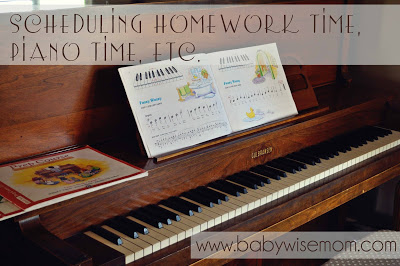Get tips for when to have your kids do homework each day and when to have them practice instruments, sports, or other activities.

When Brayden and Kaitlyn were both young (Kaitlyn was a baby), I sat in a meeting with moms in various stages of life (we all were in a presidency together over the teenage girls in our church).
We were planning an activity. I watched a mom with teenagers pull out her calendar to see if she was available that day. I kid you not, every square inch of that calendar was filled in. I commented, “Oh, so I guess as your kids get older, you don’t get more time, huh?”
She laughed and said, “No, you don’t.”
Well, that changed my future plans some. Here I was dreaming of the day I would have more time to do all of these things I wanted to. And I now hear that when your children grow up and move out, they are even harder than when they lived with you…I am still asking for opinions on this one (so far, all affirmative) and wrapping my head around it.
So maybe you never get this time I dream of. That was a fanciful object I experienced before I ever bore my first child.
As my children have grown (now 8, 6, 4, and 1), I have seen that yes, it is true that I do not have more time now than I did when my kids were younger.
As an 8 year old, Brayden does not take up less of my time than he did as a 2 year old. You have the normal time you would spend with a child, you have teaching how to clean or cook, you have listening to descriptions of the latest Lego creation, you have driving to and watching sporting events and other extracurriculars, you have volunteering in school, you have helping with homework, you have helping practice piano, you have playing catch…it all takes time.
There are certain things you do that require time and require some real focus from you as a parent, like homework and piano. These are moments when it is helpful if you can focus in on the one child.
So how do you provide the help each child needs while still parenting the others?
First, I must say, if you are paying for your child to take some sort of lessons, it only makes sense that you have your child practice. I know my children’s piano teacher has students who don’t practice at all. What is the point in paying for lessons if you don’t do the work you need to do to learn?
Students who don’t practice progress so slowly that they often end up dropping out at some point. So making sure this practicing happens is important.

Post Contents
How to Schedule in Homework, Piano and Other Activities
It is easy to say “make sure your child practices” but is harder to really make happen in real, daily life. Her are some tips.
SCHEDULE IT
This is really an extension of all of the scheduling practice you got when they were younger. I remember juggling naps and independent play…now I juggle homework, piano practice, driving kids places, and so forth while still having to juggle those naps and independent play.
So first, pick the time of day you are going to do whatever it is your child needs help with. Before school? After school? After dinner? Do what works for your family. Have it be part of your routine.
A note on scheduling, I find it works best for our family to do these things first. Just like chores, we get the homework and practicing done before we start playing. It is so much easier for a child to find motivation when they have playing to look forward to than it is to interrupt play to do work.
Your child might need a snack before you start homework or practice. If so, do it. Hungry children are grumpy, distracted, emotional, and non-compliant.
SCHEDULE OTHER KIDS AROUND IT
This is probably the biggest concern of people–how to manage the other children while one child needs your full attention.
Schedule your other kids around it!
If you have a baby, have this practice/homework/whatever time happen during a nap of baby’s.
You can have the other children:
- Nap
- Have Rest Time
- Color or draw
- Do other table time activities
- Have Independent Playtime
- Have Sibling Playtime
- Have TV Time
- Read
- INSERT YOUR IDEA HERE
All you need is to have an explicit activity that your child is supposed to be doing.
WORK TOWARD INDEPENDENCE
Do not hover over your child as your child does his homework or practices his instrument/sport/whatever. Be close and ready to help if needed, but you want your child to be able to work independently as soon as possible. You will need to check homework and correct notes/form sometimes, yes. But you don’t need to guide the child through every problem and note on a regular basis.
Having your child be relatively independent in these activities makes it so when the next child comes along and starts school or music lessons or a sport and needs your attention and help, you can offer it without completely overwhelming yourself. You can also get to the point where one does homework while one does piano and you can help as needed.
I usually clean something or cook something while they are working on whatever they are working on. Sometimes I read or just plan things. These are activities I find I can usually step away from quickly and easily. I don’t want to be totally wrapped up in something and unable to help when needed, but I also want to be distracted enough I don’t turn into a helicopter mom.
MAINTAIN FLEXIBILITY
With children one or older, you can be pretty consistent and predictable. With a baby, however, you have growth spurts and random wakings to work around. Have a “Plan B” if the baby is not cooperative during your regularly scheduled homework/practice time. It is much easier to meet disruptions with grace when you have a game plan.
Having a plan B will also help you prevent that moment the next morning when you are walking out the door and suddenly remember your child never did homework the night before…never a fun realization.
Related Schedule Posts on This Blog:
- Activity Overload
- Balancing Time With Children
- Combo Schedule is Okay
- Essential Elements to Any Routine
- Family Scripture Study
- Getting a Consistent Schedule
- HOW TO BALANCE MULTIPLE SCHEDULES
- HOW TO HAVE A ROUTINE FOR YOUR BABY AND STILL HAVE A LIFE
- THE KEY ELEMENT TO STARTING A ROUTINE
- Let Your Schedule Serve You, You Don’t Serve Your Schedule
- Managing the Entire Family’s Schedules
- PLANNING LESSONS/SPORTS/ACTIVITIES–CHOOSE THE RIGHT TIME OF DAY
- Planning Your Schedule
- Planning Your Schedule for Multiple Children
- Schedules Can Be Hard
- Thriving and Surviving the Morning Rush
- TIPS FOR ORGANIZING YOUR FAMILY SCHEDULE
- When to Do Homework?
- Why a Solid Chore Schedule Can Save Your Sanity

When is your homework/practice time? What are your tips for making this work?
